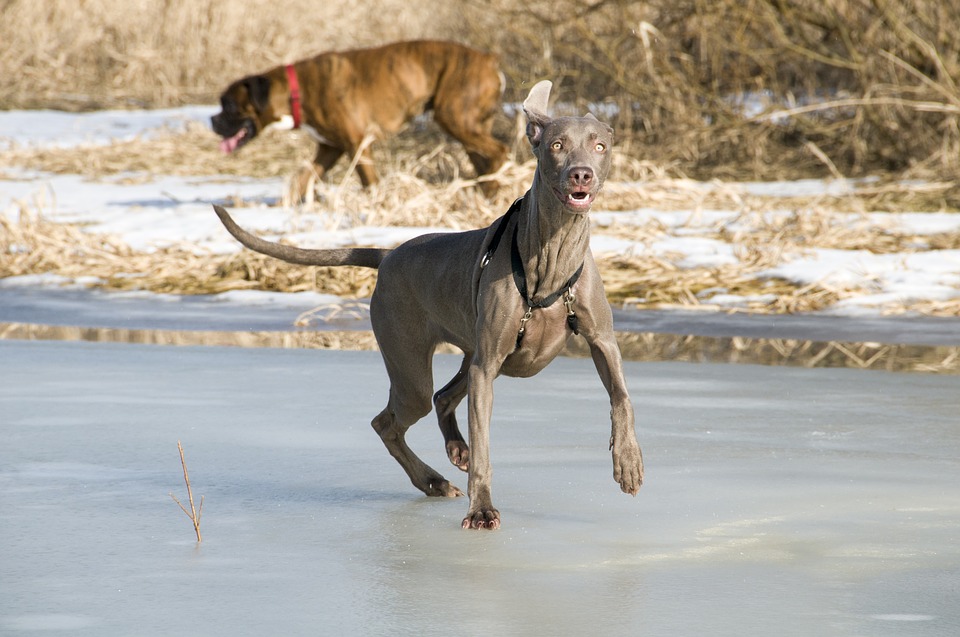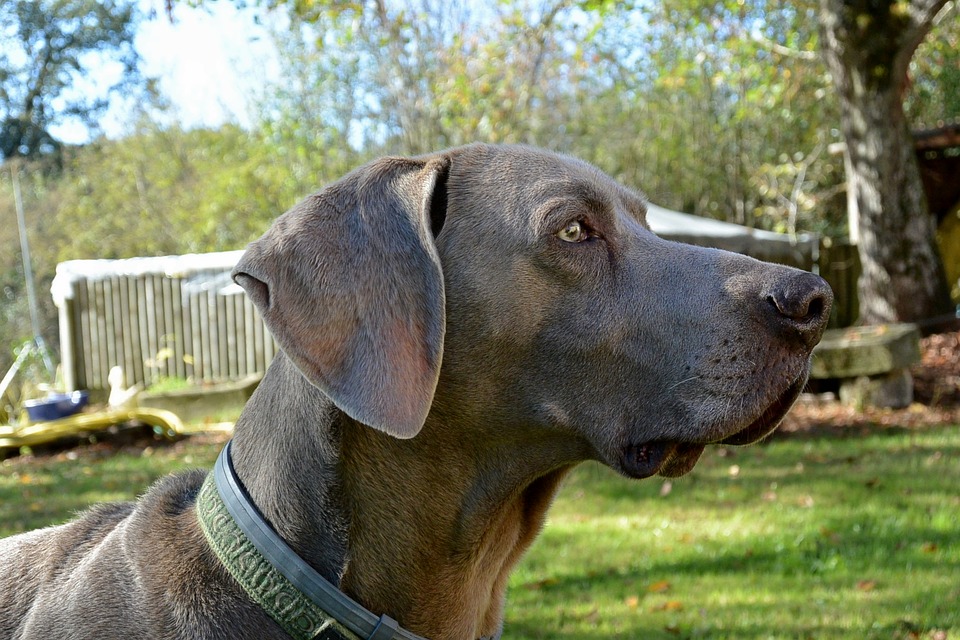
Weimaraner: Your new pet
The Weimaraner is a large, agile, athletic, and elegant dog, with short and velvety fur.
It is a quite trainable dog, and its intelligence leads it to behave very well as a guard dog. We must remember that their breed is among the great hunting dogs, but they are also affectionate and obedient.
These dogs have a great personality that makes many people fall in love with them. They are strong, slender, and their penetrating gaze reflects how skilled they can be with great training.
Considering that they belong to the group of hunting dogs and guardians, we can highlight that it is quite easy to train them since they listen with full attention to their masters and follow the instructions assigned to them. However, that does not take away the tenderness and sweetness they have from a very young age, and even more during its growth. Even when it is an adult, that kindness accompanies it.
The Weimaraner is one of the most beautiful, stylized, and incredibly elegant large dogs thanks to its characteristic fur that makes it unmistakable. Nonetheless, its highly valued hunting skills make it stand out.
This beautiful dog is nicknamed «the gray ghost» because of its fur color, but it is so patient that they are ideal for families with young children as long as they are dynamic and active.
In the beginning, the Weimar Braco was a dog used for hunting.
Supposedly, the true history of the origin of this breed is not known, only the proposed one from the 19th century, when the Grand Duke Charles Augustus, a nobleman greatly fond of hunting large animals, and ruler of the Duchy of Weimar in Germany, meets the predecessors of the current Weimaraner.
These large, robust, and gray dogs made a great impression on Grand Duke Charles. His surprise was so strong that he decided to develop a breed of dogs capable of hunting.
Not satisfied with this, he created a royal decree so that only the nobility raised the Weimaraner, and they would grow as hunters.
When this great dog was unknown to the world, they only hunted large animals, and that is why their temperament was so strong and aggressive, unlike the current ones.
For a long time, the Weimaraner breed was banned for sale and even kept in the hands of very few breeders, which is why this breed of animals developed among very special hunters.
Then, the invasion was directing the hunt towards smaller prey, such as birds and rodents.
From the 20th century, some copies of the breed entered the United States, and it was automatically known and recognized in other regions.
Currently, the Weimaraner is not only a hunting dog, but is also a search and rescue dog, for training and sports competitions, and even as a great pet among many families.
Weimaraners are large, strong, and muscular dogs. Males reach between 61 and 68 cm and weigh between 30 and 40 kg, while females measure approximately 62 cm and weigh between 28 and 34 kg, although they are taller than wide.
That is why they need to be in activities other than daily, because the level of energy they have is quite high, highlighting their hunting nature.
The most striking thing about this great dog is its fur color since they are always gray, sometimes lighter, and sometimes darker, but do not change color.
For the most part, the Weimaraner has a short and thick fur. However, there are dogs of this breed that have it a little longer, but the thick and short fur benefits them since it protects them from humidity.
For the most part, the Weimaraner has a short and thick fur. However, there are dogs of this breed that have it a little longer, but the thick and short fur benefits them since it protects them from humidity.
The head of this dog is wider in males and thinner in females, while still being in harmony with its body. The ears are quite long and wide, and their blue eyes reflect the intelligent look of this dog since puppies. Nonetheless, as they grow, they change the color from blue to green and then to a more amber color.
The tail of the Weimaraner breed is quite strong, and when the dog is in motion, it places it horizontally and slightly elevated, while when it is at rest, the tail is hanging.
Previously, the length of the tail was amputated, but today it is not necessary and is considered illegal in many countries.
The Weimaraner is a strong, intelligent, and skilled dog thanks to its offspring of a hunter. It is calm and balanced in villages or the countryside, but life in the city is not enjoyable since it does not feel stimulated with labor.
That is why living in open places where it can run, play ball, and follow smell traces is essential for the development of its intelligence, remembering that it was originally a working dog in big huntings.
It is a family lover, faithful, and patient. However, you have to be careful when it is with young children, as it can be rough at certain times.
If it does not train or learn as a puppy, the hunting instinct can easily surface. That is why it is also advisable that before adoption, keep in mind that the family must attend long mountain walks and large places. It is not a city dog, much less an apartment dog, despite how adaptable it can be to these areas.
History and Origin of the Weimaraner

The Weimaraner is a working dog since many years ago, even from its beginnings as an animal hunter. The true origin concerning this breed is not yet known, according to many connoisseurs of the breed, but based on some known data, different stories come up. Despite this, a known origin is the one from the 19th century. This origin became the original story of this breed, known and taken as real.
Then, the story of this great dog begins with the Grand Duke Charles Augustus, a nobleman very fond of and attracted by the hunt for quite large animals. This man was the governor of the Duchy of Saxony – Weimar – Eisenach found in Germany. He met the predecessor dogs of the current hunting dog called Weimaraner.
This gray, robust, and large dog made an unparalleled impression in front of the Grand Duke Charles Augustus when he saw it. The surprise that this dog gave the Duke was so strong that he decided to develop a dog breed skilled enough for the type of hunting that he was so fond of doing.
Besides that, he created a royal decree so that the nobility were the only ones to breed the Weimaraner dogs, being these used for hunting. When this breed of large dogs was unknown to the world, the Weimaraner existed exclusively for the hunting of very large animals. Consequently, their temperament and character were intensely strong and aggressive, unlike the dogs of this breed today.
For many years the sale of these great dogs was prohibited. They even kept their breeding in the hands of very few breeders. Because of this, the development of the Weimaraner is among special hunters.
Subsequently, the invasion of countries was directing the hunt towards other slightly smaller prey, such as birds and some rodents. At the beginning of the 20th century, the Weimaraner left its small region of origin for Howard Knight, who loved the breed and was a member of the German Club of the Weimaraner. Then, a large part of this breed was taken to the United States of America and immediately became known and recognized in other countries and regions. In 1928, the breed began to gain prominence, becoming recognized and popular throughout the world.
Currently, the Weimaraner is not exclusively a hunting dog but is also a rescue and search dog, even a dog for sports competitions, beauty competitions, and family pets.
There is a peculiar legend that says that a long time ago, a German prince from one of the best goldsmiths in the kingdom received a gift, which was a silver carving of a hunting dog. When he handed it to him, he told him that every night and when there was no one around to see, the small statue would come alive and take care of all its possessions, watching its territories as if it were a ghost.
On one of those nights, the German prince appreciated the incredible transformation of the sculpture into a live dog. Additionally, the Weimaraner in silver turned into what it is today through a spell of a royal sorceress. Then, you could say that because of its elegant and large size, this dog breed is a statue that came to life.
An author of dog breeds books about hunting dogs, called Lavonia Harper, cites a very poetic description that says: “A gray aspect in the middle of a meadow covered by mist, an optical illusion of liquid silver that dilutes in the fog. Two golden eyes that tear the calm…. ”. Due to the sensation it causes of a soul that watches at night, with silver and shiny gray fur, as well as the overwhelming nights and the fog linked with the vegetation, the Weimaraner receives the nickname of “Silver Ghost» or «Gray Ghost».
For centuries, the sculptures and engraved statues of this breed have been found in different regions of Germany, Austria, and France, as well as in its streets and monuments.
Another well-known legend about this breed is that related to the goddess Artemis in Ancient Greece or Diana the Huntress, as the Romans call her. The twin sister of the god Apollo had a bad character that was only dissipated by hunting, in which she had dogs similar to the Weimaraner with her, those who had silver color according to its description. However, there are many ancient monuments where dogs appear similar to this beautiful breed.
Breed Characteristics

Weimaraner dogs have the characteristic of being strong and of large size. They are dogs that will always show you that their muscles are not only from exercises, but they have natural muscles.
That is why its standard size tends to vary between males and females, females being naturally a few centimeters smaller than males, also depending on their daily exercise and feeding.
The best-known measures in the male Weimaraner vary between 61 cm and 68 cm, acquiring a weight that can vary between 30 kg and 40 kg the largest and fattest. While the female Weimar Braco varies their size between 62 cm and 64 cm at most, with a varied weight between 28 kg and 34 kg.
Nevertheless, neither sex has weights or exaggerated sizes, but each one is in proportion to its size and weight. Emphasizing that the Weimaraner needs high-level daily exercise in different activities to keep their weight, size, and strength in balance, highlighting the nature of a hunting animal that is very characteristic in this breed.
Another very striking feature in this dog breed is its unique and unmatched fur color, as it is always gray. Sometimes it can become a lighter gray, sometimes a darker gray, but it is still gray after all.
In addition to its incredible characteristic in the color of the fur, it is worth noticing that the vast majority of Weimaraner dogs have fairly short and thick fur. Although, some dogs of this breed have a slightly longer fur due to its origin. However, the most seen and chosen are the dogs with thick and short fur since it benefits them by protecting them from moisture.
Keep in mind that the nature of the Weimaraner is to be a hunting dog and that, in their history, they needed to have thick fur and a size large enough to be able to perform their hunting jobs.
The head of the Weimaraner is quite wide and even larger in males than in females and is moderately long while keeping its head in harmony with its body. The ears of this animal are incredibly long, quite wide, and slightly rounded at the tips, allowing them to be good hunters and listeners. These dogs have a shade of color in their eyes that reflects their intelligence and their expressive look, but that changes from blue to green shade and becomes a shade of amber as it grows.
The snout of this dog is powerful and long enough to allow him to sniff his prey freely, even more in the male Weimaraner. Besides, they have a dark incarnate color in the nose that gradually turns gray to the back. The jaws of this large dog are strong, and its teeth are rectangular, strong, and complete. Its bite is similar to the shape of a scissor, and it is quite dangerous.
The tail of these amazing dogs is strong and resistant. It is a little below the dorsal line of the body, and, when the dog is in motion, the tail is placed horizontally with a small elevation, while when the tail is at rest, it is hanging. Before, it was legal to amputate the tail of these dogs but, nowadays, it is illegal and unnecessary in many countries.
The movement of the Weimaraner fluidly covers the surface. The anterior and posterior members are parallel with a low and long run. When it jogs, its back remains quite straight, and its steps are firm.
Another important characteristic of this breed of dogs is their life expectancy. Their age or their time to live is of about 10 or 12 years, in which it can grow from birth to old age.
Similarly, we must recognize that Weimaraners are usually quite healthy dogs and have a very lower risk of acquiring inherited diseases. Despite this, they can be prone to suffering from gastric torsion, so it is recommended not to exercise before and after eating, only after a prolonged time. Additionally, other diseases that the Weimaranercan acquire are spinal dysraphism, hemophilia, or hip dysplasia, as well as other less dangerous diseases.
Behavior with other dogs

Dogs of this breed are usually easy to train, loaded with energy, passionate about searching, fieldwork, and outdoors, although sometimes it could be somewhat temperamental. In the field, Weimaraner’s works as an excellent hunting dog, cunning before its prey, it always stays wary and alert, without becoming aggressive, only doing the job for which it trained, following some of its instincts. Its aquatic activity is also remarkable and outstanding.
A very favorable aspect of the Weimaraner breed is that they are dogs that have innate behavior to be sociable. Therefore, they usually get along not only with people of all ages but also with other pets, particularly dogs, especially if they are of their same breed. Consequently, the Weimaraner is a great option for a pet dog that adapts without problems to family life, to any company, and type of environment.
The Weimaraner has great qualities, an amazing nose that enables it to be a hound, search dog, hunting dog, and also for water sports. It can keep track of injured animals, and also works with strong instincts as a guard and protection dog. As a pet, the Weimaraner is a wonderful companion, very nice and warm.
These are clever dogs. Their balanced and serene character is easily manageable to achieve effective socialization and make friends, although it requires a firm education. This dog is attentive and is always ready to follow orders, and is especially vigilant to any strange situation, novelty, or threat.

If the Weimaraner shares a home with other dogs and other pets, it can share and lead a healthy coexistence in harmony. Particularly, to make this possible, the owner must ensure that the Weimaraner’s companions share a character similar to that of this dog, serene and balanced. The traits of positive behavior that allow it to live effectively with other animals will depend on the education and training the Weimaraner received.
It is of crucial importance for a friendly and effective coexistence that, early in the training of this dog, it shares and coexists with other dogs so that it develops the capacity for socialization, tolerance, and learning to live together. Remember that the first customs taught to any dog are the most prevalent.
Likewise, the Weimaraner prefers to live with dogs of the same breed, with whom it shares similar activity and attitudes. The best companion for a Weimaraner is one of the same. The members of this breed are gregarious, given to group work, sociable, and good partners. For their part, avoid dogs of small breeds, they could be seen as prey and develop aggressiveness.
In general, the Weimaraner, optimally educated, is a good dog to share with other animals in any home.
Diet and nutrition

Nutrition is key in the care of large dog breeds, especially in the case of the Weimaraner. Through proper nutrition, the dog obtains the essential nutrients, vitamins, and minerals that allow it to grow and develop under ideal conditions. Likewise, their emotional affective development depends on proper nutrition.
In the case of the Weimaraner, the recommended foods can be commercial preparations of the best quality, with components that are rich in nutrients and of high energy value. The above translates into a feed or purine that has as its main ingredient the high-quality animal protein, such as that derived from lamb or beef, and that is preferably free of cereals and aggregate compounds such as rice, corn, cereals, or that it contains small amounts.
If you compare, the animal protein of lamb and beef is easier to digest for the Weimaraner, and also provides more nutrients that are essential for the dog to exhibit a soft, bright, and silky fur, characteristics of a healthy and well-nourished individual.
Similarly, if you supply cereals, they must be food in small quantities and mainly based on rice since, unlike wheat and corn, rice is a cereal that infrequently causes allergies. Also, it is a carbohydrate of slower assimilation, which will allow the Weimaraner to feel full but not overfeed.
Concerning other notorious nutritional needs in the Weimaraner, they do not differ from those needed by large dogs. In addition to the diet, it is important to emphasize the proper hydration necessary for this dog. Water in abundance is ideal for maintaining the good hydro electrolytic balance of the animal, and, at the same time, improves all digestive function.
If possible, it is advisable to avoid homemade food, because, although there are now homemade menus made in special diets for dogs, it is often difficult to cover all the nutritional requirements of the dog with these homemade meals. Likewise, avoiding sweets and chocolate altogether is essential to prevent digestive disorders such as diarrhea.
There are numerous toxic foods for dogs, including chocolate, candy, and some cereals. To educate yourself about the meals you should avoid at all costs, you should consult the specialist, who can also provide you with the best tips for the proper nutrition of the Weimaraner.
As a special fact, the gestation time of females in this breed is on average of about two months, and during the last 3 weeks of pregnancy, you should modify the diet. Increase by 30% the usual ration to ensure adequate nutrition of the mother and the puppies. Recall that proper and specific diet at all ages reduces health problems and optimizes the development of the dog.
Health and general care

The Weimaraner is par excellence a striking breed of dogs since these dogs are tall, thin but athletic, and of size and elegance without comparison. It is a breed highly appreciated for its beauty, and its care is simple and basic, intended to preserve its health and prevent diseases, maintain its hygiene and cleanliness, and improving its life quality.
Health is perhaps the aspect to which the caregiver of the Weimaraner should give the most attention. This dog, like most large breeds, has a life expectancy of around 10 to 12 years. It is usually a fairly healthy and strong breed and has a lower risk of developing hereditary or genetic diseases.
However, some of the pathologies that can affect Weimaraners are serious, such as gastric torsion, which you can prevent if they avoid exercise immediately after eating.
Equally serious, other pathologies that can affect this breed include spinal diastrophism, hemophilia A, and Von Willebrand disease. Hip dysplasia is a disease that frequently affects large dog breeds, and the Weimaraner breed can also suffer from it.
It is important to take care and monitor the health and development of this dog, for which they should go to the veterinarian at least once every six months. The specialist is the best person to detect any inconvenience with the health of the Weimaraner in time, improving the diagnosis and treatment of your pet.
Also, remember to keep the vaccination and deworming calendar of the dog up to date to prevent diseases, especially if it performs outdoor activities.
When it comes to internal deworming, a veterinarian should follow this process as it starts since the animal is a puppy and continues throughout the dog’s life. The guidelines or medications should be in the hands of the veterinarian. This aspect requires a lot of attention in this breed since the Weimaraner is a dog of fieldwork like hunting, and could come into contact with feces of infected animals, as well as ingesting rats or drinking contaminated water. For this reason, a deworming frequency of every three months is advisable.
External deworming will eliminate fleas and ticks, for which there is also prevention. These ectoparasites are hematophagous and can cause serious cases of anemia, so it is necessary to take care of this aspect.
You can purchase various products that act as repellents or pesticides at pet stores, with the advice of the veterinarian. Take the anticipation of checking Weimaraner’s hair after walks or work periods, to detect an infestation in time.
Concerning hygiene, ear and eye cleaning are necessary to prevent diseases. Weimaraners have droopy ears, in which dirt debris can easily accumulate and cause infections. It is advisable to use sterile dressings with a solution to clean the ears, at the same time you can apply cleaning drops recommended by the veterinarian. For the eyes, they are cleaned in the same way daily to remove blemishes or spots caused by tears.
As for brushing, although Weimaraner’s hair is short, you should brush it frequently, twice a week on average, to remove dead and dirty hair so it can always keep a shiny fur. Baths can be with shampoos for special dogs of their skin, and it is recommendable to do it once a month, even though the habits and condition of the dog will determine the frequency. Similarly, brush their teeth weekly to take care of their oral hygiene.
How to train, teach, or educate a Weimaraner
The Weimaraner is a smart and intelligent dog, with a poised and peaceful character, and given to obedience and training, so that its education and training will not be a complicated job.
The owner and trainer must be an authority figure that, at the same time, is affectionate since it is necessary to establish limits from the first moment to prevent the dog from developing unwanted behaviors. Nonetheless, provide the necessary affection to the dog so it can feel an emotional reward when it does something right. The Weimaraner is a sensitive dog, usually affectionate, loyal, unconditional, and loving with its owners, so it hopes to receive the same.
Starting training since they are puppies is the best option, you can prevent and correct behavior problems better at this age. When the dog is in training, punishments, shouts, and any form of violence need to stay aside, since they are not appropriate to obtain the dog’s obedience and, on the contrary, they can cause the Weimaraner to become rebellious and aggressive.
The best technique during the education of the dog is positive reinforcement, which consists of rewarding correctly executed behaviors and ignoring unwanted behaviors. The animal receives a demonstration of the correct behavior, and in this way, it can correct it.
To stimulate the physical and mental development of the Weimaraner, you must regularly carry out the necessary games and walks, as in these games, they will train for object search and tracking. Additionally, practicing these games with the dog allows the relationship between both owner and pet to improve. This puppy requires activities that allow it to channel the great energy that overflows them and stay entertained.
When the Weimaraner is a puppy, it has to interact with children, people outside the home, and other animals, to avoid seeing smaller beings as possible prey, and to be sociable with guests and others pets. This process of socialization is key to the proper behavior of the Weimaraner.
The training begins by observing the Weimaraner puppy, with the observation, you can determine its needs, urination, defecation, food, and play. Knowing these points already begins the training. Walks when it needs to release, and establishing food and game places are some of the initial steps.
Do not forget that when it performs positive behavior or obeys an order, the Weimaraner must have a reward of caresses, a compliment, or a snack. Repeating each behavior and order is the method for education and training.
To teach the basic commands to the Weimaraner, use this positive reinforcement method. Give the order, wait for it to execute it, and reward it, or you can also apply the clicker method.
For it to learn hunting and field activities, it is wise, after he has learned the simple orders, to mix it in open environments with already trained dogs from which he observes and learns.
Behavior with Humans
The Weimaraner is a dog with great qualities for working with humans, as well as its intelligent, cunning, affectionate, warm, and loyal personality make it an excellent companion for most people and the ideal pet for many homes, especially those located in rural areas.
This puppy is known as the gray ghost, for its appearance and the color of its fur, and its impressive blue eyes. However, there is nothing to be afraid of since it is a beautiful canine specimen. Its friendly and sociable character is patient and balanced in different situations, coexists perfectly with families that are active, dynamic, and who likes to share outdoors, play, and have moments of recreation.
The Weimaraner dog usually manifests a dynamic, curious, and intelligent attitude. It is cunning and obedient, qualities that it demonstrates during its training and education. This breed of dogs, nonetheless, has a sweet and dedicated character to its family, being patient, kind, and affectionate, and it is, therefore, the ideal pet for families with older children, new families, and lonely young people with an active and entertaining lifestyle.
As for young children, they are also good to share with them, although it should always be under the supervision of their owner since the Weimaraner is a large and strong dog, whose game movements could be too abrupt and accidentally hurt the little ones.
The Weimaraner stands out for its elegance and size, suitable for any type of ground, and stands out in field skills such as hunting. Thanks to its manageable personality, full of energy, committed to work, obedient, and observant, the Weimaraner is an easy dog to train for many jobs.
It is submissive with a kind and firm owner, attached and protective with its family, and territorial leader with other dogs. To strangers or unknown people, they may react with shyness or distrust, so effective socialization is recommendable from the first months of life to avoid home problems.
As a companion dog, it is great as an excellent protector and guardian of the home since it is very faithful and loyal to its family, with whom they want to maintain closeness and proximity. They may experience anxiety if left alone at home for a long time.
Thanks to its observer qualities and its impressive intelligence, Weimaraners have strong hunting instincts, something innate in this breed. They are strong, athletic, and precise, and they have qualities for the search, so they have been used for decades as hunting dogs in all types of ground, whether arid or temperate.ro
They are obedient and determined when hunting, so they can be seen as farm helpers, hunting dogs, and it is also common for them to participate in dog competitions, in obedience and search tests, and beauty competitions for their bearing and style.
Perfect Environment
The Weimaraner is a hunter par excellence, a dog that belongs to an active and dynamic environment, full of energy, and with the necessary activities that allow it to drain all this potential daily. This dog is versatile, obedient, but at the same time strong in spirit, well-trained acts as a balanced dog, noble, kind, obedient, and easy to train.
The Weimaraner has performed duties as a guard dog and company dog for families, in any type of situation, home, or environment. Likewise, it is a great dog to be an assistant in rehabilitation therapies and to excel in various sports and activities. Thanks to this dog’s physical conditions, it is suitable for any kind of environment, from cold winters to hot summers. The Weimaraner resists all seasons and temperatures of the year, so it can be in various climates and environments.
With children and other pets, it is a friendly dog, even though it is not the best for environments where they live with small dogs who can have a somewhat hyperactive personality that could irritate them. Likewise, with young children, they should be under supervision at all times, given that Weimaraner is a very energetic dog and could have sudden movements that accidentally injure the little ones.
For family environments with large children, young people, couples, or active lonely people, the Weimaraner is an excellent company that enjoys daily activities, requires games, exercise, and stimulation, so it is not appropriate for people with sedentary habits.
In its environment, the Weimaraner needs an owner with discipline and affection, who teaches it limits and shows appreciation and courage for its obedience and work. It is ideal for living on farms, in the countryside, or rural homes with spacious land for walking, exercising, and, of course, working on the hunt.
Nevertheless, this does not mean that it is not a city dog. The Weimaraner can adapt perfectly to life in the urbanity of a modern city, as long as its owner is committed to meeting their daily needs for exercise and activity. You must take it out for a walk every day, and to play in the park or open space every week. If the house has large gardens or patios, it will be much more comfortable for the Weimaraner than a small apartment.
The important thing is that the Weimaraner is always active, entertained and that it receives the necessary attention from its owner, the focus is to prevent this puppy from getting bored and consequently develop behavioral problems, aggressiveness, or bad habits.
The Weimaraner is a great pet, elegant, hardworking, obedient, faithful, and loyal, wonderful for most homes, be it a country house or a city apartment.
